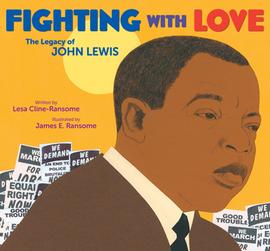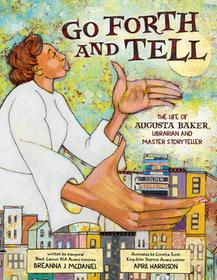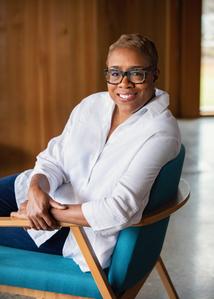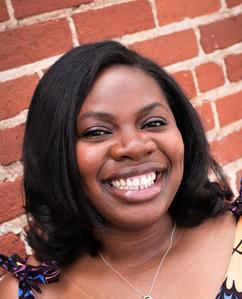 Lesa Cline-Ransome is the author of numerous nonfiction and historical fiction titles for picture book, chapter book, middle-grade, and young adult readers. Her verse biography of Harriet Tubman, Before She Was Harriet, illus. by James E. Ransome, was nominated for an NAACP Image Award and received a Jane Addams Children's Book Honor, Christopher Award, and Coretta Scott King Honor for Illustration. Fighting with Love: The Legacy of John Lewis, illus. by James E. Ransome (Paula Wiseman Books) is a nonfiction picture book about the life of civil rights leader John Lewis.
Lesa Cline-Ransome is the author of numerous nonfiction and historical fiction titles for picture book, chapter book, middle-grade, and young adult readers. Her verse biography of Harriet Tubman, Before She Was Harriet, illus. by James E. Ransome, was nominated for an NAACP Image Award and received a Jane Addams Children's Book Honor, Christopher Award, and Coretta Scott King Honor for Illustration. Fighting with Love: The Legacy of John Lewis, illus. by James E. Ransome (Paula Wiseman Books) is a nonfiction picture book about the life of civil rights leader John Lewis.
 Breanna J. McDaniel is the co-founder of REIYL (Researchers Exploring Inclusive Youth Literature) and the award-winning author of the picture books Hands Up! and Impossible Moon. Go Forth and Tell: The Life of Augusta Baker, Librarian and Master Storyteller, illus. by April Harrison (Dial Books) is a nonfiction picture book about librarian and storyteller Augusta Baker.
Breanna J. McDaniel is the co-founder of REIYL (Researchers Exploring Inclusive Youth Literature) and the award-winning author of the picture books Hands Up! and Impossible Moon. Go Forth and Tell: The Life of Augusta Baker, Librarian and Master Storyteller, illus. by April Harrison (Dial Books) is a nonfiction picture book about librarian and storyteller Augusta Baker.
Here, the authors discuss writing about historical figures for young audiences and what difficult work it is to fight with love.
Lesa Cline-Ransome: Hello! Is this really our first time talking one-on-one?
Breanna J. McDaniel: It is! I have always admired you, so it's awesome to have this opportunity. I wondered, after reading Finding Langston and For Lamb, how I could get in the same space with you.
Cline-Ransome: Thank you so much. And I love your work. I feel like we have the same influences and inspirations--that we both celebrate family, history, and legacy. I love that your books feature multi-generational stories, and the books of mine that you mentioned also incorporate family. I think it's so much a part of who we are and our culture. I feel we have a huge kinship.
McDaniel: When it comes to thinking about contemporary Black books, I believe we're all in conversation with each other somehow. When there's conversation between books about themes that resonate with what I've written about, I feel so included!

|
|
| Lesa Cline-Ransome (photo: John Halpern) |
|
Cline-Ransome: I think often when we write that there's a huge personal piece of us that leaves a little bit of ourselves on the page. Here's to us and our complicated, dynamic, beautiful families.
McDaniel: I love that. Here's to us!
So, I didn't know you had two books coming out until I went to your website. I have a book coming out in January and in April. And then your books are January and March, right?
Cline-Ransome: Yes. You have the Augusta Baker book coming out, and what's the other book that you have coming out? Is it a secret? Is it a surprise?
McDaniel: No, it's not a secret. It's called Cute Toot, and it's about two sisters who have a farting contest.
Cline-Ransome: Oh, look at you! Your range is impressive. And your other book is on the other end of the spectrum, in nonfiction?
 |
|
| Breanna J. McDaniel (photo: Tina Chang) |
|
McDaniel: Right. It's about Augusta Baker, the first Black librarian to oversee children's services for the New York Public Library system. In New York, she looked at these ridiculous, horrible representations of Black children in children's literature in the '30s, '40s, and '50s, and said, "No, we can do better than this." So, she did better. She wrote, she created collections of books that responded to these negative portrayals of Black people, she taught, she consulted, and she was a master storyteller.
I got to read some interviews with folks who talked about her as a teacher, instructing librarians on how to share stories in story times. They always marveled at her storytelling ability--that these stories came alive as she told them. They wanted to be a part of that too. And then her advice to storytellers and librarians was to go forth and tell these stories because people want to hear them. Go Forth and Tell. That's where the title comes from.
Cline-Ransome: Oh wow. I love the story. Not only who she was, but also that we are telling a story about the power of story, the power of librarians--Black librarians in particular--and ensuring that our children have access to stories that are meaningful and reflect them. I can't wait to read about Augusta Baker.
McDaniel: And the incredible illustrations are done by April Harrison!
Librarians were such a big part of who I would become as a reader and now as a researcher. Still, there's more stories to be told. My childhood librarian, Mrs. Carnes, who I've dedicated the book to, went to library school at Clark Atlanta University. I didn't know there was a library sciences program at Clark Atlanta back in the day! I'm from Atlanta, and I had no idea. There's more history that needs to be brought forward.
Cline-Ransome: When I wrote the Finding Langston author's note, I discovered a librarian named Vivian Harsh who was one of the first Black librarians in the city of Chicago. She felt it was her mission to bring Black authors like Langston Hughes and Gwendolyn Brooks into her branch, and she transformed her entire community.
McDaniel: Here's to librarians! I'm so excited about the John Lewis book.
Cline-Ransome: I've always been very politically engaged and so being able to write about people in the political realm has been powerful for me. I recently came out with the Shirley Chisholm book, Loud and Proud, but then I delved into the life of John Lewis, who is a hero of mine.
It took me a long time and a lot of research to really understand how he balanced the hatred and violence he was experiencing with the love and faith he used in nonviolent protest. That understanding helped me to create the title: Fighting with Love. I grew up believing there was only one way to protest and that was loudly and actively. But John Lewis showed me that you could protest with your heart and with your love. I feel like our senses of love, respect, and decorum have been lost, but that's something that John Lewis maintained throughout his entire career.
McDaniel: Being from Atlanta, I grew up in the cradle of nonviolent resistance. Yet, I wonder about the role of nonviolence in creating change right now. Growing up here, meeting John Lewis, hearing about his experiences, I've seen that balance you mention. It's different when giants like him are standing in front of you--they make you see the possibility and the potential of nonviolence. But it's hard to put into practice personally in the face of constant violence.
Cline-Ransome: This is why the book especially challenged me during the 2020 election. I was attending a lot of protests, and I was hearing many of the same words John Lewis had heard at his protests. I remember one where the words, the anger, the energy were coming at me kind of fast and furious. I could hear John Lewis's words: "No child is born in hate." It allowed me to see people a little bit differently in that moment, and I could for the first time see how you could use love and non-violence as a form of protest. It gave me the strength to keep marching and to stand firm in my own beliefs and dignity. Then I went back to my desk to write his story while using his philosophy to get through a particularly difficult time.
McDaniel: What an awesome example of how we individually and collectively contain multitudes. It just continues to push against the idea of a Black monolithic experience--we're so big. We're so broad. We're so beautiful.
Cline-Ransome: Yes, he is a powerful figure. I was fortunate to meet him shortly before he died in Atlanta, and he was every bit as generous and kind as I imagined he would be.
I think it's wonderful to be able to write about our heroes and to share them with young readers--to provide them with this beautiful history of ours that kids don't often get a chance to read about. So, I thank you for your work.
McDaniel: I thank you for your work. I think, again, that these books being in conversation with each other allows us to show that heroes can be lots of different types of people. They can be the people who sit next to us at the dinner table, and they can be civil rights icons who teach us compassion and teach us how to fight with love.

